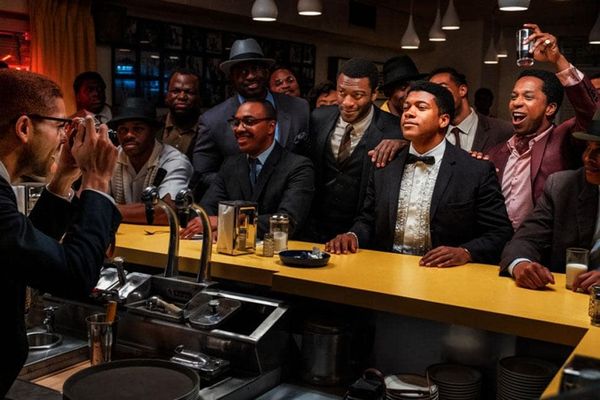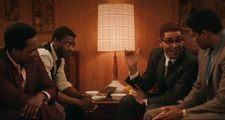 |
| Aldis Hodge, Leslia Odom Jr, Kingsley Ben-Adir and Eli Goree in One Night In Miami |
Set on a legendary night in February 1964 when Muhammad Ali (then still known as Cassius Clay), Malcolm X, Sam Cooke and Jim Brown came together for a discussion which preceded momentous change in each of their lives, Regina King’s One Night In Miami has made a big impression on film fans and critics alike and has garnered Golden Globe and SAG Award nominations for Leslie Odom Jr, who plays Sam. He was among the attendees at a press event last month, hosted by Ann Hornaday, at which screenwriter Kemp Powers and co-star Aldis Hodge, who plays Jim, discussed the importance of the film and what it meant to them.
“The biggest known unknown for me was the fact that this night actually happened that on February 25 1964, after Cassius Clay beat Sonny Liston,” Kemp began, prompted by Ann. “He did spend the night with Malcolm X, Sam Cooke and Jim Brown, and the next morning is when he announced for the first time to the press, that he was a member of the Nation of Islam. So I mean, that's what set it all off for me, because in very different ways, I've always viewed these four men as representative of a nascent Black Power movement.
“I mean, the civil rights struggle have been going on for quite a while, and we were getting ready to head into Black Power. And I think these guys represented very different forms of that black power, including Sam Cooke, who you think of as a pop star, but if you really dig deep into his history and his his business regimen, and how he was empowering musicians and artists at the time, you realise that that whole self determination Black Power mindset, is very much in line with what people like Muhammad Ali and Malcolm X believed.
 |
| Finding direction |
“So knowing that, knowing everything that happened to these men leading up to this night, the very real things that happened leading up to it and everything that was going to happen within 12 months of this night, I felt like 1964 was a crucial year for all four men. So I was just trying to have this crucial moment be something that happened during these interactions with one another one another in a way that I felt was believable. I wanted to create believable characterisations.
“Now it's interesting, because when I first wrote the story, as a play, I got a lot of notes about how I was structuring it wrong, because people were going from how we see these men today. Today, the most famous man of all, is, of course, Muhammad Ali. But on that night, the power dynamic, I saw it as being very different. I saw it as a situation where Cassius Clay, at 22 years old, has his three big brothers all trying to exert influence over him. So Cassius Clay is a little brother at 22; Jim Brown, who was only 28 is his bigger brother; and Malcolm and Sam, both in their 30s, are their big brothers. And it's your big brothers trying to convince your little brother, what the best path for him is, as he goes out into the world, and that's a very, very different dynamic that calls for the characters to be positioned in a different way than your average person might, you know, naturally do it. And and I just wanted to be have those characterisations be as realistic as possible. And then that was really the start of it.”
Ann notes that one of the parts of the film that impressed her most was the vignette focused on Jim Brown which opens the film.
“Right,” says Kemp. “Well, I mean, of course, the the point of those four prologues is that each of these men suffers a major fall kind of leading up to this night. With Jim Brown, that's kind of challenging because on the surface, no one could crack Jim Brown's armour. So there were no there were no public calls for Jim Brown leading up to this. Quite the opposite. He was flying high and seemed pretty indestructible. But it was this idea – and it came from a true Jim Brown story.
“People don't realise Jim Brown actually wrote not one but, I think, two autobiographies when he was still in his twenties, back in the Sixties. And in one of them he recounts that story of coming back home. I think it was after his first year or second year at Syracuse. He was the most famous college football player in the country. And his aunt asked him to go over to this old guy's house. And it was exactly that the guy kept them out on the porch. And they had this whole conversation and the way Jim Brown phrased it, he didn't realise until he was halfway back home, he said, ‘Son of a bitch, he still wouldn't let me in the house.’ Because the guy doesn't allow blacks in his house.
“So the fact that he was this star, Jim Brown, and it was a lovely conversation, the guy was being flattering towards him, but despite it all he was still forced to sit out there, it really showed him that like, with all the fame in the world, to certain people, you're still going to be seen as less than them. And to me that really, perfectly encapsulates this idea. This belief among some people, that the most exemplary black man is still lower than the least exemplary white man. So I wanted to really have that show up in the script. And I think the way that Regina staged it, and the way that Aldis and Beau Bridges executed it, it's supposed to hit you as a bit of a gut punch, because you're supposed to be hit the same way. Jim is hitting that moment.”
 |
| Conversing in the hotel room |
Ann asks Aldis how he found his way into the character of Jim, and if – as Jim is the only one of the four men represented in the film who is still alive – they had the chance to meet.
“No, I didn't have a chance to meet him during the process of filming and preparation,” Aldis says. “Oddly enough, I know a few people actually who had been tied to him, in terms of growing up knowing him and watching him work, watching him engage in his philanthropic work, you know, talking to different sides of gang members, trying to bring them together to say, ‘Look, brother, let's figure this out, let's, you know, build up opportunities,’ still teaching and still try to push that positivity in the community. So I was able to get a little bit of that side of that, and then also just digging into my research of, more or less, not so much what we know about him, and not even so much about, you know, with sports, in that I see him as an entrepreneur and a businessman. So I wanted to understand his business acumen and understand where his mentality was.
“So I started studying that, because after this particularly good ‘64, very soon after he goes on to retire, he makes this transition into film and television...So for him, when we find them in this film, he is in that transitional space of maintaining who he is but also taking control of his his power and his value. He's been this megastar football player but he still knows how people see it in the streets.”
Jim is apparently happy with the way the film turned out, Aldis adds.
“Oh wow!” says Kemp, delighted. “I didn’t know that.”
“That was that was the most, I guess, nervous conversation I've had in the last couple of months,” Aldis admits.” I was talking to his daughter. This was maybe like, last week. It was over the holidays. And she was like, ‘Yes, so my dad saw the film,” and I was like ‘Cool, cool. He saw the film. So like, what did he think?’ She said ‘he thought you did a great job.’ I was like, ‘Cool. I'm good. You know, as long as he's happy, I'm happy.’ But yeah, he's, from what I heard, he's happy with, with what it is. And honestly, I mean, how can you not be?
“I think it's really fantastic. I think it's a wonderful celebration of these four men, a wonderful celebration of their friendship and of what they contributed to us as a people and to a greater extent us as a country, because we all benefit from what they have given, what they have sacrificed. Right?”
One Night In Miami is currently available to watch on Amazon Prime.





















